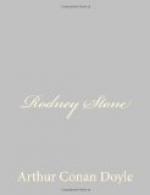“You must let me know you, and know you well,” said she. “Your uncle and aunt are quite old acquaintances of mine, and though you cannot remember me, I have held you in my arms when you were an infant. Tell me, little man,” she added, turning to me, “what do you call your friend?”
“Boy Jim, ma’am,” said I.
“Then if you will not think me forward, I will call you Boy Jim also. We elderly people have our privileges, you know. And now you shall come in with me, and we will take a dish of tea together.”
She led the way into a cosy room—the same which we had caught a glimpse of when last we came—and there, in the middle, was a table with white napery, and shining glass, and gleaming china, and red-cheeked apples piled upon a centre-dish, and a great plateful of smoking muffins which the cross-faced maid had just carried in. You can think that we did justice to all the good things, and Miss Hinton would ever keep pressing us to pass our cup and to fill our plate. Twice during our meal she rose from her chair and withdrew into a cupboard at the end of the room, and each time I saw Jim’s face cloud, for we heard a gentle clink of glass against glass.
“Come now, little man,” said she to me, when the table had been cleared. “Why are you looking round so much?”
“Because there are so many pretty things upon the walls.”
“And which do you think the prettiest of them?”
“Why, that!” said I, pointing to a picture which hung opposite to me. It was of a tall and slender girl, with the rosiest cheeks and the tenderest eyes—so daintily dressed, too, that I had never seen anything more perfect. She had a posy of flowers in her hand and another one was lying upon the planks of wood upon which she was standing.
“Oh, that’s the prettiest, is it?” said she, laughing. “Well, now, walk up to it, and let us hear what is writ beneath it.”
I did as she asked, and read out: “Miss Polly Hinton, as ‘Peggy,’ in The Country Wife, played for her benefit at the Haymarket Theatre, September 14th, 1782.”
“It’s a play-actress,” said I.
“Oh, you rude little boy, to say it in such a tone,” said she; “as if a play-actress wasn’t as good as any one else. Why, ’twas but the other day that the Duke of Clarence, who may come to call himself King of England, married Mrs. Jordan, who is herself only a play-actress. And whom think you that this one is?”
She stood under the picture with her arms folded across her great body, and her big black eyes looking from one to the other of us.
“Why, where are your eyes?” she cried at last. “I was Miss Polly Hinton of the Haymarket Theatre. And perhaps you never heard the name before?”
We were compelled to confess that we never had. And the very name of play-actress had filled us both with a kind of vague horror, like the country-bred folk that we were. To us they were a class apart, to be hinted at rather than named, with the wrath of the Almighty hanging over them like a thundercloud. Indeed, His judgments seemed to be in visible operation before us when we looked upon what this woman was, and what she had been.




